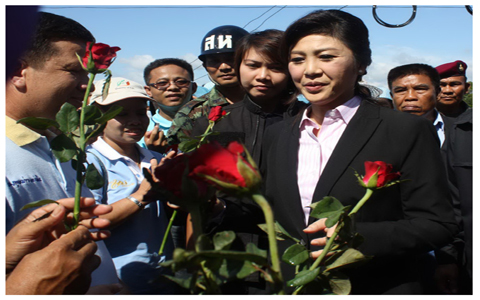Why now?
 That was the big question raised by quite a few people when Prime Minister Yingluck Shinawatra suddenly visited the violence-prone deep South on April 29.
That was the big question raised by quite a few people when Prime Minister Yingluck Shinawatra suddenly visited the violence-prone deep South on April 29.
It was her first visit to the region since she assumed the premiership on August 8 last year. Earlier, she paid two visits to Hat Yai, the farthest stop of the southern region that she ventured to. The first visit was on December 2 last year to preside over an event to celebrate His Majesty the King’s birthday and the second visit on April 2 – two days after suspected insurgents set off car bombs in Hat Yai and Yala province, killing about a dozen people and injuring a few hundred more.
Undoubtedly, the visit was belated. Her predecessor, Prime Minister Abhisit Vejjajiva visited the strife-torn deep South about one month after he assumed the top executive’s post. It took about three months for the late Prime Minister Samak Sundavarej to visit the region while another prime minister, Somchai Wongsawat paid his visit 75 days after he assumed the office.
Informed sources in the forward command of the Internal Security Operations Command told the Isra news agency that Prime Minister Yingluck’s visit was rather sudden because they were notified only two days in advance. One day ahead of the prime minister’s visit, deputy prime ministers Kittirat Na-Ranong and Yongyuth Wichaidit and Deputy Agriculture Minister Natthawut Saikua were in Yala to attend a dinner talk on the economy in the deep South held at the Rajaphat University’s Yala campus.
Although the visit was welcome, it was however disappointing that the prime minister did not venture out of the Sirindhorn barrack throughout her visit. All the 500 local people who were allowed to meet with the prime minister were members of social or pressure groups sponsored by the government.
One local resident, Ms Koliyo Hali whose father was killed in the Krue Se mosque massacre said she was very happy to meet the prime minister. She admitted that she did not like the prime minister but her attitude has changed ever since meeting her.
Another resident, Mrs Yunaida Jaekalo, president of a women’s group in Yala, has a different opinion about Ms Yingluck. She said she didn’t think the prime minister’s visit would help resolve any problems in the restive region.
It should be noted that the prime minister’s sudden visit came a few days after she led her three deputy premiers to perform a rod nam dum hua ceremony as a show of respect for Privy Council president General Prem Tinsulanonda at the latter’s residence. It was reported that General Prem asked Ms Yingluck to pay special attention to the unrest problem in the deep South. In response to General Prem’s plea, the government offered to support the sarn jai thai soo jai tai project which was initiated by the retired general. The project enables youths in the five southernmost provinces to learn the cultures and traditions of people in the other regions.
Also, Ms Yingluck’s sudden visit came one week ahead of the planned visit to Thailand during May 7-15 of Mr Sayed Kassem El Masry, a special envoy of the secretary-general of the Organisation of Islamic Council. The OIC envoy is reportedly very interested in alleged human rights violations in southern Thailand and he will report directly to the OIC secretary-general about the situation in the deep South.
Successive Thai governments from past to present have made clear they do not want the OIC or any international organization to interfere in Thailand’s internal affairs for fear that the unrest issue will be internationalized and hence justified foreign intervention.
Seasoned observers of the unrest problem believe that the prime minister’s meeting with General Prem and the visit of the OIC special envoy could be the factor prompting the prime minister to pay her first visit to the restive region.
During the visit, the prime minister told the Press that she had assigned Deputy Prime Minister Yutthasak Sasiprapa to head an ad hoc committee to ensure unty in the implementation of government’s policies for the deep South by all the 17 ministries and 66 state agencies responsible for security affairs and development projects in the region.
Whether General Yutthasak will succeed in ensuring unity in the execution of government policies remains to be seen.
